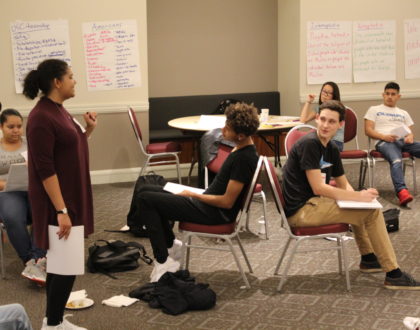InIt students explore immigration, with an empathy lens

In February, InIt’s monthly Program Day focused on the topic of immigration. Guided by the “Empathy Domain” from the SEL framework, youth engaged in conversations and activities about immigration to explore themes of power, privilege, and social equity. The Program Day was packed with active learning, from understanding the history of US immigration to recognizing how immigration personally impacts the lives of InIt students.
The Program Day started with an exploration of what students may know or have heard about immigration to-date. As they brainstormed common associations with the terms “immigrants” and “Americans,” students immediately noted that the former carries more stigma than the latter. Students also unpacked the common phrase: “The US is a nation of immigrants.” While heard often, what does this really mean? Students agreed that the sentiment, on its face, is meant to encourage and welcome the contributions of diverse cultures to the US. However, they also recognized that the statement, as a generality, serves to erase the unique experiences and oppressive histories of indigenous populations, Africans brought to the US as slaves, and people who lived on territory that was acquired by the US without their say. As this discussion continued, students were able to draw a direct link between the theme of immigration and InIt’s overarching focus on social justice and equity.
To expand students’ knowledge about immigration, InIt welcomed Suffolk Law School Professor Ragini Shah, who led a presentation on myths and facts about the US immigration process. She was joined by legal students from Suffolk Law School’s Immigration Clinic, who shared information about the (often arduous) process of becoming a legal US refugee, and further helped the youth to think critically about proposed reforms to federal immigration policy. This presentation segued into a panel with speakers from the Matahari Women Workers’ Center (a Greater Boston organization of women of color, immigrant women, and families who organize for personal and societal transformation, justice, and human rights), The Muslim Justice League, and The PAIR Project (“PAIR” is an acronym for “Political Asylum/Immigration Representation Project”).
From the organizers and activists representing these social justice-focused initiatives, students learned about immigration’s inseparability with discrimination – present today, for example, via widespread Islamophobia in the US. Examining the issue of Islamophobia, the speakers and students also sought to unpack current events such as: the increase in hate crimes in the US; programs to counter so-called “violent extremism;” differing media portrayals of violence depending on the race/religion of the perpetrator (i.e. ‘terrorism’ as linked to people of color vs. ‘lone wolf’ as linked to a white person); and the troubling tokenization of individual Muslims as representatives of the entire religion. Recognizing the misconceptions, discrimination, and bias at play, students unpacked the systemic forces that influence public thinking about these issues – with an eye towards promoting greater social equity moving forward.
After grappling with immigration on a macro level, the Program Day concluded with a “Real Talk” session about this topic on a more personal level. As students shared their reflections and personal stories of immigration (and/or those of their close friends and families) — and listened supportively to their peers while providing encouragement — the group was grounded in a profound sense of empathy and community. To reinforce the SEL domain of empathy, InIt staff also shared their stories, while lauding the students’ courage and vulnerability. Soon, the group was bonded over the stories’ common themes — including the pressure to assimilate into American society, feelings of loss over the culture their families left behind to while transitioning to life in the US, and a deep sense of gratitude for the opportunities they have been afforded. In this safe space, the Program Day concluded as participants left feeling empowered by sharing their stories, accomplished in their learning and growth, and encouraged in the journey to improve social equity.
